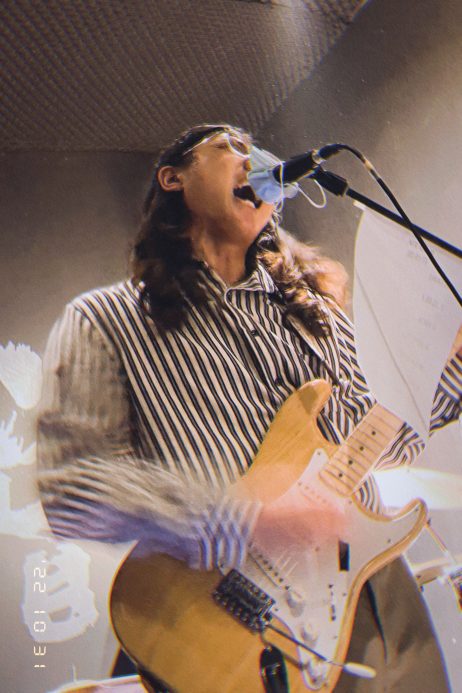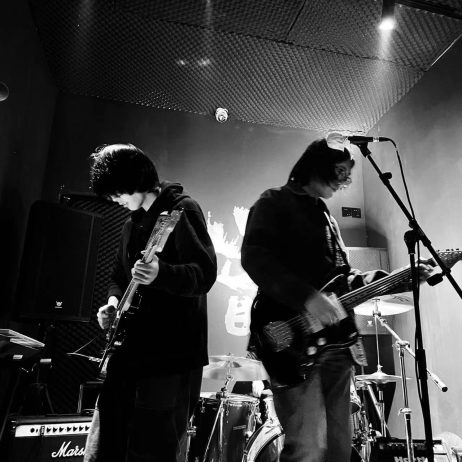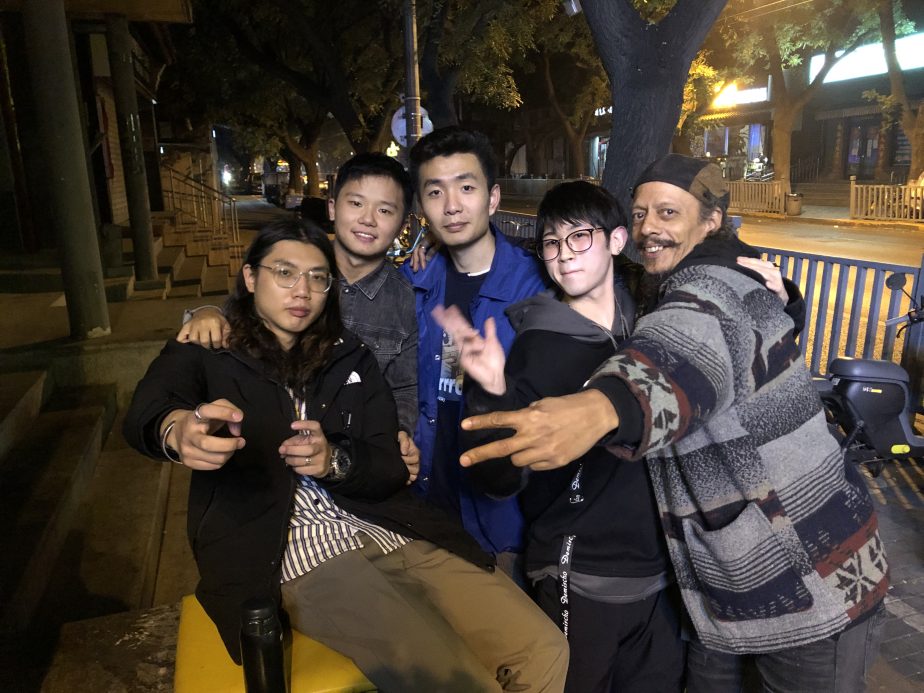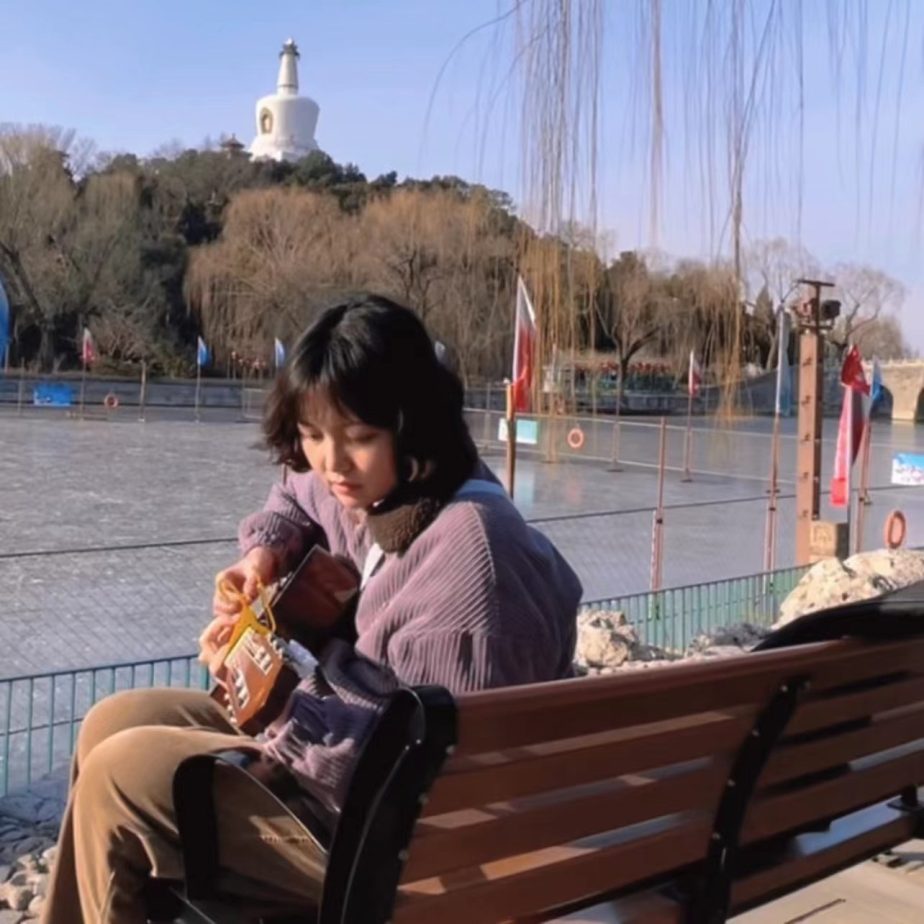Chong Jia Guo writhed and roared into a microphone he had adorned with both a disposable mask and his bandmates’ set list. His fellow members of BAD TV played with equal post-punk abandon during an October 30 Fresh Out the Pot (FOTP) showcase.

Chong Jia Guo, the frontman for BAD TV. Image courtesy of BAD TV.
FOTP is both a series of gigs and an artist collective designed to support bands like BAD TV that were founded during the pandemic, a highly unfriendly period for underground musicians. This particular Halloween weekend show was held at 盲区 (Manqu) SPACE&BAR, a narrow-as-a-trench venue on Beijing’s bohemian Gulou street. The snug space was packed to the brink that night by show goers famished after a summer of China’s zero-COVID restrictions, which had led to endless gig cancelations and outright extended blackouts at more established livehouses across the country. The brief easing – and resumption of shows – in the fall was followed by yet another wave of restrictions during an infamous new winter outbreak. That clampdown only appears to be easing now.
Chong, the long haired and bespectacled BAD TV frontman, said he and his bandmates – guitarist Fai, bassist Chen Me, and drummer Sun Chengyi — were eager not only to play the Manqu SPACE show, but also sign onto the FOTP artist collective shortly afterward.
“The epidemic undoubtedly made things worse for bands just starting out,” he said. The restrictions kept young performers from playing and building buzz and a fanbase. Signing onto the FOTP collective lets BAD TV and the other bands “share resources and cooperate. Which is great, because we need each other.”
Fellow FOTP signees 不行动委员会 (Non Action Committee) played before BAD TV at Manqu SPACE, wowing the crowd with art rock flourishes like a flute solo. Non Action Committee is comprised of lead singer and guitarist Sun Muyuan, bassist Kedong, drummer Chacha, and synth and guitar player Jieshi, who said FOTP will help their band with publicity and securing a discounted rehearsal and recording space.
In addition to Non Action Committee and BAD TV, FOTP founder Eric de Fontenay has signed nine other bands from across China to the collective. He told The Diplomat he also aims to connect the signees to photographers, videographers, and digital disturbers, “because we want to create a network of partners to support the collective and actually give the artists a say.”

Non Action Committee performs. Photo courtesy of Non Action Committee.
De Fontenay, frequently clad in a fedora or backwards cap, is a wry-smiling Canadian iconoclast who first started the promotional platform Music*Dish in New York in the 1990s. He was inspired to found a China branch while stopping over in Beijing after attending a Hong Kong music conference in 2009. This was in the midst of not only Beijing’s post-Summer Olympic economic boom, but also its music underground buzzing internationally as Beijing-based bands like P.K.14 were covered by the New York Times and Carsick Cars opened for Sonic Youth. As de Fontenay recently told the Beijinger, he was so impressed while attending gigs at then-institutions Yugong Yishan and D22 (which has often been called the Chinese capital’s CBGB, the birthplace of punk in New York City) during his first visit that Beijing proved irresistible.
Part of MusicDish*China’s launch was managing one of the country’s would-be arena headliners, Second Hand Roses. Famed at home for their innovative blend of hard rock with traditional instruments like the suona (akin to an oboe) from their native northeastern region of China, Second Hand Roses were praised by none other than The New Yorker on the North American tour that de Fontenay arranged.
More recently, de Fontenay collaborated with like-minded Beijing institutions-in-the-making Nugget Records and then-newly opened music venue 24D (before it relocated to Chengdu this winter) to host a showcase centered around up and coming bands, and record those performances live to cassette tape as an attention-grabbing new merch item (the latter being spearheaded by Nugget).
Now MusicDish*China is upping the ante. While it began as a series of live-streamed gigs for Chinese bands founded during the pandemic, Fresh Out The Pot (FOTP) is now an artists’ collective bubbling over with benefits for young acts. First signees CypherT won over viewers with their mix of ska and nu metal in an FOTP livestream at hutong-hole-in-the-wall Soi Bar this summer.
De Fontenay said FOTP bands will be supported with both domestic and global digital distribution after signing to the collective. And even young bands that don’t commit to that extent will still be promoted through playlists and a database of emerging talent that is crowdsourced by fans who want to recommend their own new favorites.
China lacks equivalents to Bandcamp and Soundcloud, not to mention similar entry points for licensing and merchandising – deficits de Fontenay founded FOTP to address. “Many new acts aren’t sure how to distribute their music within China, let alone globally. Whereas bands back home can search online and be overwhelmed by too many options,” de Fontenay told The Diplomat after a FOTP livestream in July at Soi, where he joked with owner Van G. about ordering absinthe at the venue’s prior location (before the capital’s hutong tumult forced them to move), and then reminisced about the Beijing underground’s distant unfettered past.

The members of BAD TV pose for a photo with FOTP founder Eric de Fontenay (right). Image courtesy of BAD TV.
Though there was no absinthe this time, de Fontenay tipped a beer and described why he’s optimistic about the future of underground music in China. Aside from FOTP’s current offerings, he also wants to use it to mentor bands as they gain traction, from royalty collection to angling for wider exposure: “A lot of bands here don’t realize the gaps, and ignorance is bliss,” he explained. “They don’t think. ‘Oh, if I was in the States, I’d be looking at licensing opportunities for, say, a streaming TV series.’ After all: Kate Bush, who is indie, was the most streamed artist this summer because of Netflix.”
De Fontenay foresees a “golden age” of pandemic bands with pent-up talent to burn and a hunger to be mentored on exciting-but-complex online resources, along with a deeper need for offline support. Aside from giving de Fontenay deja vu about the New York music scene’s freewheeling ambiance at the dawn of dot com and MP3 copyright, his current endeavor starkly reveals what sets China’s industry apart, for better and worse. “In the West, indie music is bottom up to support new artists. But in China it’s top down. So it made me wonder: what I could bring to make people think differently about how this industry could evolve?” de Fontenay said.
De Fontenay isn’t alone in seeing an urgent need for such changes. At the height of the capital’s gig stifling COVID restrictions this spring, Michael Pettis — co-founder of D22 and the Maybe Mars label that bolstered Beijing’s reputation as a burgeoning music city a decade ago — told The Diplomat the capital’s “entry level died,” and with it the competitive lifeblood that keeps a scene from stagnating. In that same article, 24D co-booker Shao Qiao called the current scarceness of new-band focused venues “not as fun” as the scene’s nascent days.
But even before the pandemic, both elders like Pettis and those on the cutting edge like Qiao and de Fontenay agreed that emerging artists were first left in the lurch by a slew of zoning and licensing crackdowns that forced many small and forward-thinking music venues to shut down. The remaining mostly midsize to large venues favored established acts that could fill those spaces. COVID-19 exacerbated the issue. During the pandemic, up-and-comers saw their few places to build an audience dwindle all the more as venues ceased operations to comply with restrictions, and in some cases closed entirely as their revenue ran short.
Jieshi said FOTP has helped Non Action Committee navigate the ever-shifting performance landscape during zero-COVID. He went on to describe the scrutiny that makes typical gig planning, promotion, and execution fraught. “Instead, small performances can be held in ‘blind area cooperatives’” as long as the musicians play under the guise of “public rehearsal classes.” Such loopholes, used by both nascent spaces like Manqu and established institutions like School Bar, would have been difficult for young bands like Non Action Committee to know about had they not pooled knowledge and resources with their fellow FOTP signees.
One of the bands that hasn’t signed onto FOTP but starred in one of their livestreams is raucous rocking quintet Sunset Wild. Frontman Alumi – who likes to not only sing but also skat rap, and whose guitar strap is stylized to look like yellow crime scene tape emblazoned with a “do not cross” warning – says he understands that big livehouses and music festivals see better known bands as sure bets because they are “considering profit, or maybe even survival.”
“But we have struggled for a few years now as a new band. All of our attempts to perform have been interrupted by COVID.”
Yayi, vocalist for synth-wave punks The Clinic, felt similar despair before reaping the benefits of starring in one of FOTP’s first livestreams (and later signing to the collective). “After our first two shows, we stopped for a whole month,” Yayi recounted. “Seeing older bands on the stage, one after another, I really envied them.” Such experiences have made both bands all the more grateful for FOTP’s backing.
Acts on Nugget Records are similarly heartened. Home to both that label and a music venue that neighbors Soi and rivals its cozily scant floorspace, Nugget also prioritizes platforming new acts, said indie folk singer-songwriter Hazel Shang (竹子), one of their recent signees (who just released her debut EP on cassette through that imprint). She added: “Those of us just getting started can hardly find any decent support. But not only does Nugget embrace different types of great music, its top-notch sound engineering also helps bring the best out of the performers.”

Hazel Shang (竹子). Image courtesy of Hazel Shang.
Cold wave and electronic artist Sourtower (酸塔, aka Wang Xu; on Instagram @silknoose and Weibo: SOURTOWER酸塔) is one of Hazel’s Nugget labelmates. She agrees that such lifelines are essential, adding: “Performing experience is very important for musicians who are just starting out. Some small venues have given me a lot of help and opportunities to perform, Nugget in particular. The musicians who have worked with them know that they really do it for the love of art, and they put in far more than they get back.”
Since signing with and performing at Nugget, Sourtower is on firmer artistic footing. She said that most other indie shows rely on verbal agreements that too often crumble if the booker “finds someone else who is ‘better’ than me and is unapologetic. I cherish every opportunity to perform. I have never missed a show. So when that happens, I get angry, but I can’t do anything about it. I think they would have handled it differently if I had a higher profile.”
Such cutthroat tactics sadly abound in rising scenes with the Wild West vibe de Fontenay has seen in New York and now Beijing. And that motivates this indie music industry dynamo to support promising young acts so that they can reach the potential that is so clearly apparent to him.
It won’t be easy, de Fontenay admits, because “when you say ‘music collective’ in London or Melbourne or New York, those words mean something, even if there aren’t many around.”
“When I introduced it here, I had to use collective farming as a reference,” he chuckled. “There was just no frame of reference.”
But as they wrack up livestream views and accrue knowledge of how to navigate one of the world’s most volatile, but nevertheless promising, music undergrounds, the FOTP bands are not only understanding where de Fontenay is coming from, but are also gaining much-needed confidence after months of music-impeding restrictions. As Ayi from The Clinic put it: “We’re looking forward to deeper cooperation with MusicDish. They’re working really hard to help new bands develop.”
The partnership is meaningful from a different angle for Jieshi, especially as he watches zero-COVID slacken and wonders: Will livehouses go the way of outdoor venues and restaurants and return to normalcy? Or will a virus exit wave once again crush bands’ hopes?
Because Jieshi and the rest of Non Action Committee are unsure how all this “will affect rehearsals, productions, and performances, FOTP gives us a window to observe the attitudes of other bands, and see how other bands respond to the ever-changing epidemic prevention policies,” he said.
Or, as BAD TV’s Chong put it, joining the Fresh Out the Pot collective is “like a dispossessed child finding a big warm family.”

































